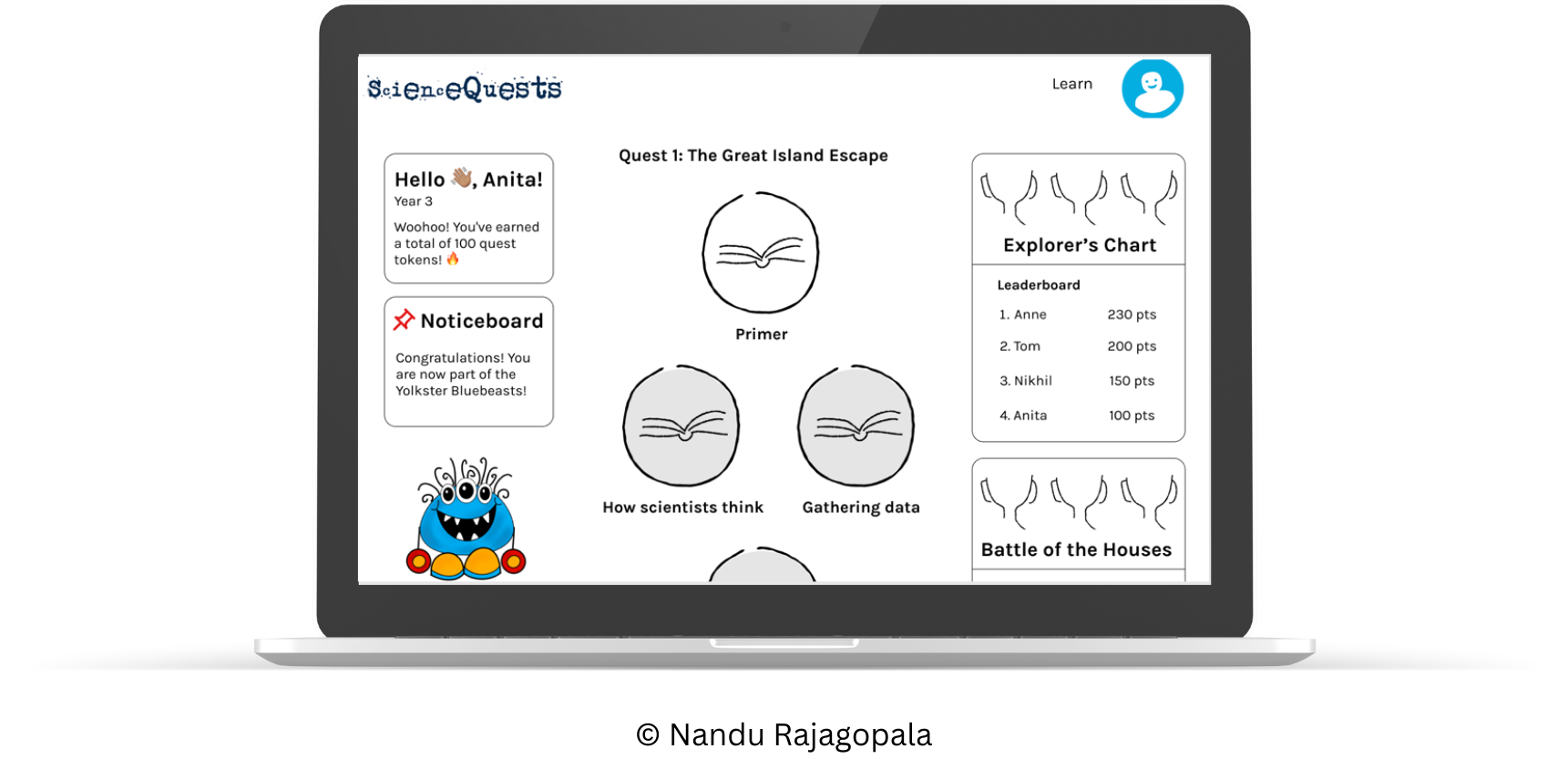I spent the second half of 2023 building ScienceQuests (a gamified web app to help kids learn science) and exploring ways of making online learning more effective and engaging for kids. Having spent some time researching how people learn, talking to potential users, building/testing a prototype, and refining my pitch for a competitive startup grant that I was shortlisted for, I thought I’d summarise some lessons that I learnt from the overall experience.
 An initial prototype of ScienceQuests
An initial prototype of ScienceQuests
Identifying a problem:
👉🏽 It isn’t enough to solve a problem; the key question is whether you are tackling a problem that customers would pay money to have solved. It can be sometimes difficult to separate signals from noise; is there really a problem or do you just want there to be a problem? Or are you force-fitting a pet solution onto what seems like a problem? In the world of parents and schools and education, the guiding light, unfortunately, is grades in an important exam, not learning for its own sake.
👉🏽 It’s wise to spend some time selecting a problem to work on. I’m not just talking about founder-market fit, but the decision-making process behind selecting what you want to work on. Did you, for example, wade through lots of ideas, weigh them, maybe test some assumptions, and then commit? Or did you go for the first idea that made business sense to you? I’m sure there isn’t a right or wrong answer here, but spending some time on brainstorming and idea selection can make life easier later on.
👉🏽 Sometimes it’s better to explore, build, learn, and come to your own conclusion. I remember speaking early on with an EdTech founder who warned me that the sector can be challenging. I have since heard it mentioned multiple times. But, having done your research, if you think you have a unique insight, have differentiated skills, and are passionate about the sector/problem, it’s always best to have a go.
User research and prototyping:
👉🏽 Sourcing and interacting with users for research can give you a glimpse of the sales process. It’s also a good opportunity to check if you’d enjoy having your intended audience as customers and if you can bring yourself to empathise with them. If there isn’t some sort of connection, I doubt if anyone would be able to withstand headwinds when times get tough.
👉🏽 Knowing how to code can be a double-edged sword and can stop you from thinking about the smallest possible thing that can be built to test your idea/hypothesis. For ScienceQuests, although the landing page saw an organic 20% conversation (email signups to visits), I found that it was easier to set up research interviews when there was a promise of something to see/do. In fact, having a couple of kids try out the prototype and gather feedback in real time was eye-opening.
Finding the right co-founder:
👉🏽 Everyone says this and I’ll just re-iterate: finding a co-founder who is the right fit is hard. Although some online platforms can help (e.g. Y-Combinator’s), they aren’t a magic pill since the vast majority are just silent observers. I’m not entirely sure if I agree with this but I’ve seen it mentioned that the ability to attract a co-founder with only the promise of equity is in itself a way of validating an idea. I say I’m not sure because it really depends on the other party’s interests and knowledge of the sector. In a world where too many individual contributors get promoted to leadership roles, I was also amazed by how many wanted to be CEOs without ever having worked in an operational role before and/or having the ability to empathise.
You against The World:
👉🏽 In an ever-changing world, being a generalist or, at least having the ability to be skills-fluid, is under-appreciated. In fact, I think in certain societies, it is sometimes looked at with near suspicion or worse, a disqualification. Innovation comes from the mix-and-match of the things you’ve been exposed to and, given the multiple tasks I had to juggle (prototyping to research to marketing), I was glad for some of the varied experiences that I’ve been fortunate enough to have.
👉🏽 Sometimes, it’s less about you or your idea, but more about you being in the right place at the right time with the right people. A lot of things need to be in place to get things off the ground, and some might not even be in your control. For example, even if you have a wide network with relevant expertise, not everyone might be in the same phase in life as you are to join as a co-founder. Whether you go on to build a large business or your idea fizzles out at the outset, it is important to have that sense of humility.
